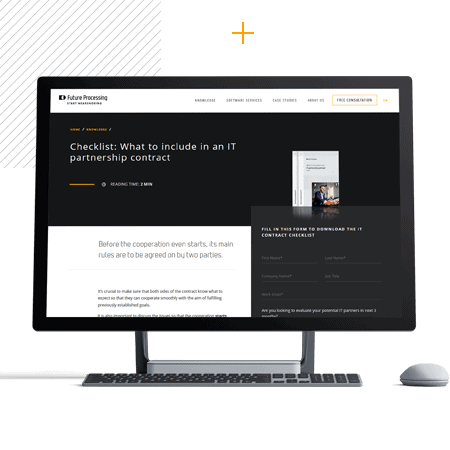
The 4 most popular types of outsourcing contracts
A well-designed business agreement is crucial to the success of outsourcing your software development. The IT contract must reflect what was agreed on during the negotiations, specify the scope of the project, exit strategy, rights and responsibilities, knowledge transfer and focus on business outcomes that both sides want to achieve. At the end of the day, you will reap what you sow.
Partnership with a right IT services outsourcing company can give great opportunities to your business. Today we live in a fast-moving and dynamic business environment and thanks to IT outsourcing services you gain the flexibility to adjust to market and clients’ needs. A well-prepared agreement covering issues such as intellectual property rights, business process, service levels, forms of outsourcing, clauses, third party involved, general obligations and rights of businesses engaged in the outsourcing services etc. form the base of business relationships.
Of course, the purpose of any contract is to facilitate establishing proper mechanisms and business processes suitable for both parties involved in close cooperation and to protect the organisations from possible penalties and undesirable actions towards each other. Forewarned is forearmed.
You can also find an outsourcing contract example and more information on what to include in an IT partnership contract in our free checklist.

Looking for more information on signing an IT contract?
It includes all important issues that appear in IT partnership contracts enlisted and grouped accordingly.
There are some golden tips to follow when selecting a contract type that suits your needs best:
- discuss all the conditions and the elements of the project before launching it,
- be clear on pricing and payment terms,
- make sure all the details are in writing,
- choose a contract that will be a good fit for your chosen work methodology.
We have prepared a summary of the 4 most popular types of outsourcing agreements.
TIME & MATERIALS CONTRACT
This is a kind of contract where the customer pays the supplier for work time (according to the prearranged hourly rate of each member of the dedicated team) and materials used by the outsourcing service provider (e.g. using the software license or other assets). Before the cooperation starts it is important to learn about the total cost of ownership and possible flexibility in this matter.
PROS AND CONS
The main advantages of a Time & Material contract terms are:
- great level of flexibility in the development and focus on Agility
- client deciding on the project’s priorities and functionalities to be developed and implemented
- general requirements of the project, as well as all the details, are discussed before every sprint
- service is billed in relation to actual days/ hours of work
- it is possible to adjust the project to the market’s changing requirements even if work on it has already begun
BUT: The project has to be very well managed and under control as the main responsibility regarding its final price and deadlines lies with the client who delivers the idea and requirements. It is also possible to analyse these issues together with the IT partner beforehand.
FIXED PRICE CONTRACT
In this type of outsourcing contract, the customer and the supplier agree on a steady ‘fixed price’ for the service (i.e. for delivering the solution). The price is estimated by a supplier based on well described scope of work to be done. The constant price means the constant scope and the deadline for the project. This kind of contract can also work very well in case of hybrid contracts like ‘fixed price per iteration’ when customer pays for each milestone separately.
We recommend defining project’s scope and estimating costs together with business and technical specialists to crystallise your idea and collect all the requirements.
PROS AND CONS
The main advantages of a Fixed Price contract are:
- product specification is delivered by the client or prepared together with the IT partner before the work starts
- the time and budget are predetermined
- the customer has the least cost risk (assuming that the scope is well defined)
BUT: In this model, there is less flexibility, and even making changes is possible while the project is ongoing, it strongly influences time and cost of delivery and may also result in contract modification. As this model requires a specification there is a great degree of work necessary before embarking on the project.
If the costs are more than the agreed-upon amount, the service provider bears additional costs.

Discovery Workshop
Interested in gathering requirements and defining the project’s scope with experts? Book the workshop to build a full backlog of the project.
FLEXIBLE SCOPE (DSDM)
This outsourcing agreement framework is a stand-alone, full lifecycle Agile project management and delivery method and it aims at delivering results to the customer quickly and effectively. The collaboration between teams and individuals is based on main principles and values of Agile, and the key to the project’s success is its alignment to the company’s business goals.
The main advantages of contracts based on a Flexible Scope (DSDM) framework are:
- clear definition of roles and responsibilities for all involved
- effective prioritising (use of the MoSCoW method)
- consisting of detailed analysis and requirements gathering even though the development itself takes place in an Agile manner
- involving the collaboration of project’s decision-makers
BUT: This framework requires a cultural shift in terms of the development team’s thinking. What is more, it may be costly to implement as it requires developer and user training.
PAIN SHARE/GAIN SHARE
The aim of this mechanism is to share the benefits or dis-benefits from project outcomes. This kind of outsourcing arrangement can be a base of an agreement signed by the parties or the mechanism itself can be included in the Target Cost contract.
The main advantages of contract based on a Pain Share/Gain Share mechanism are:
- risk and attitude to it is discussed by the parties at the initial stage of business cooperation
- the gain-share/pain-share mechanism is at the heart of target cost arrangements
- contractor gains a bonus if the actual cost is below the target cost but shares the cost if goes above it
- both parties are incentivised to deliver to baseline
BUT: This model requires strict change management processes, so it is not appropriate unless/until the design is clear, and not for small or open-ended work assignments.
SUMMING UP
We strongly advice you to choose a contract type that will best match Although it is usually a choice between the typical ‘Time & Materials’, or ‘Fixed Price’ kinds of contracts, software related services do not have to be limited to just these two options.
There are numerous software development outsourcing contract templates and modern outsourcing companies offer many indirect forms and innovative approaches to contracts to make the outsourcing service tailored to the customer’s needs and expectations.
It is worth considering contracts that are based on more partnership-like relations – especially if you’re looking for a long-term software partner and beneficial business relationship.
Today, companies from the outsourcing industry offer various pricing and outsourcing models and are open to adjusting them to chosen projects. Thanks to this the service will answer to your needs and outsourcing help your company develop. And that’s what every CIO, no matter from which industry, looks for.

Visit our ultimate knowledge base!
We’ve got more 100% free, helpful, downloadable materials for you!
You’ll find there the following materials:
Choosing an outsourcing location is also not an easy part of starting an outsourcing process. One has to be sure the service is in the hands of the best outsourcing service provider. There are a lot of countries worth considering (India is not the only one). Look at the description and advantages of outsourcing to Poland (a very popular destination in case of IT outsourcing as well as the location of companies that a lot of global businesses sign BPO contracts with).




